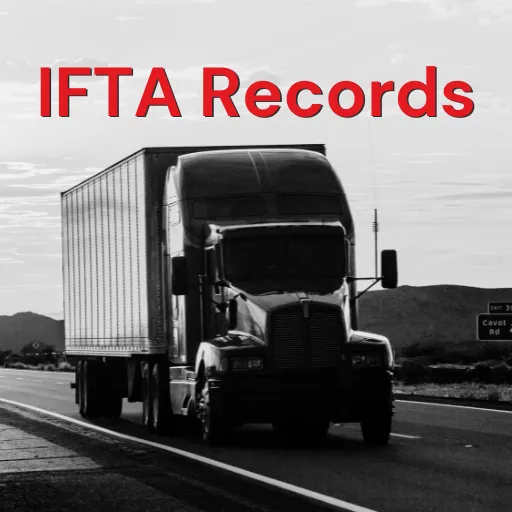| FREE Consult!
Read Our Latest Blog
These Blog Posts are to cover some of the most relevant topics, questions, and issues we see that is relevant to truckers and companies, regardless of size and load.

IFTA Record-Keeping Made Simple
IFTA Record-Keeping Made Simple: Systems That Work for Modern Trucking Operations
Effective IFTA record-keeping represents the cornerstone of trucking compliance, yet it remains one of the most challenging aspects of fleet management. This guide explores practical systems that help ensure accurate documentation while minimizing the administrative burden on your operation.
The Foundation of Successful IFTA Compliance
Successful IFTA compliance begins with understanding exactly what records you need to maintain. Every quarter, your operation must account for total miles traveled and fuel purchased in each jurisdiction. This requirement sounds simple, but managing this data across multiple vehicles and states requires systematic organization.
Essential Documentation Components
Your record-keeping system must capture and organize several critical elements. Each component plays a vital role in maintaining IFTA compliance and protecting your operation during potential audits.
Distance Documentation
Distance records must include:
Starting and ending dates for each trip
Trip origin and destination points
Routes of travel
Beginning and ending odometer readings
Total trip miles
Miles by jurisdiction
Unit number or vehicle identification
Fuel Purchase Records
Fuel documentation requirements include:
Date of purchase
Seller's name and address
Number of gallons or liters purchased
Fuel type
Price per gallon or liter
Unit numbers of the vehicles fueled
Purchaser's name
Digital vs. Traditional Record-Keeping Methods
Modern trucking operations have multiple options for maintaining IFTA records. Understanding the strengths and limitations of each approach helps you choose the system that best fits your operation.
Digital Record-Keeping Systems
Digital systems offer significant advantages for modern fleet operations. These platforms typically provide:
Automated mileage tracking through GPS integration eliminates manual calculations and reduces human error. Many systems can automatically categorize miles by jurisdiction, significantly reducing administrative time.
Electronic fuel purchase integration allows direct import of fuel card data, ensuring all transactions are captured accurately. This integration often includes automatic categorization of purchases by jurisdiction and vehicle.
Cloud storage provides secure backup of all documentation, protecting your records from physical damage or loss. This feature proves particularly valuable during audits, as you can quickly retrieve any required documentation.
Traditional Paper-Based Systems
While digital solutions offer numerous advantages, some operators still prefer traditional methods. A well-organized paper system should include:
A systematic filing method for all fuel receipts, organized by month and vehicle. Consider using expanding files or binders with monthly dividers to maintain organization.
Detailed trip sheets that capture all required information, including state line crossings and odometer readings. These sheets should be reviewed regularly for completeness.
A master log that summarizes monthly totals for miles traveled and fuel purchased in each jurisdiction. This summary facilitates quarterly filing while providing a quick reference for identifying potential issues.
Implementing Your Record-Keeping System
Regardless of the system you choose, successful implementation requires careful planning and consistent execution.
Setting Up Your System
Begin by establishing clear procedures for collecting and organizing all required documentation. Every person involved in your operation should understand their responsibilities for maintaining records.
Create backup systems to ensure no data is lost. Even with paper records, consider scanning important documents for digital backup.
Implement regular review procedures to identify and correct any issues before they impact your quarterly filing.
Training and Compliance
Ensure all drivers understand the importance of maintaining accurate records. Provide training on proper documentation procedures and establish clear expectations for submitting required information.
Create checklists for drivers and administrative staff to ensure all required information is captured consistently. Regular refresher training helps maintain high compliance standards.
Audit Preparation Through Proper Record-Keeping
Well-maintained records serve as your best defense during an IFTA audit. A proper record-keeping system should allow you to:
Quickly produce any requested documentation
Demonstrate consistent compliance with IFTA requirements
Support all claimed mileage and fuel purchases
Show clear audit trails for all transactions
When to Consider Professional Support
As your operation grows, managing IFTA records becomes increasingly complex. Consider professional support if you:
Struggle to maintain consistent documentation
Find record-keeping consuming too much time
Want to upgrade to digital systems but need guidance
Have concerns about audit preparedness
Professional services can help implement efficient systems while ensuring your records meet all IFTA requirements.
Moving Forward with Confidence
Effective record-keeping forms the foundation of IFTA compliance. Whether you choose digital or traditional methods, the key lies in consistency and attention to detail.
Ready to streamline your IFTA record-keeping? Schedule a free consultation to discuss your specific needs.

